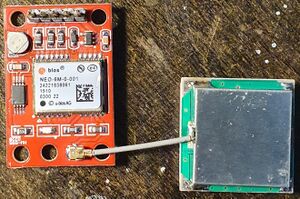GPS Module
Appearance
HW-595 Board

- Based on uBlox NEO-6M-0-001
- 5V operation (3.3 V regulator onboard)
- UART: 4800 - 230400 bps (9600 bps 8N1 default), TTL levels buffered by 220R resistors
- U.FL connector supplies 3.3 V to active antenna
- Crystal Osc, not TCXO
- LED:
- Constant: Searching
- Blink 1s: Position fix
- Battery-backed RAM contains config data and clock and speeds first-time-to-fix
- Data in NMEA 0183 format
- More background here
Board pinouts:
| Pin | Function | Description |
|---|---|---|
| 1 | PPS | 1 pulse/s, synchronised at rising edge, length 100 ms |
| 2 | RXD | UART input |
| 3 | TXD | UART output |
| 4 | GND | Ground |
| 5 | VCC | 3.3 - 5 V |
PPS can be reconfigured as a frequency reference:
- Send PPS to UART via CTS
- 0.25 Hz - 10 MHz
- Configure in u-Center here
- Output has high frequency accuracy, but suffers from jitter except at a few specific frequencies
Software
U-Center
GPSD
- gpsd
- Packages: gpsd, gpsd-clients
Check data stream with gpsmon:
gpsmon /dev/ttyS0
Can be tested with something like (Debug level 4) :
gpsd -N -n -s 9600 -D 4 /dev/ttyS0 /dev/pps0
Configuration in /etc/sysconfig/gpsd
OPTIONS="-n -s 9600" DEVICES="/dev/ttyS0 /dev/pps0"
Should auto-detect which UART is GPS connected to (baud rate, etc, with no configuration) with:
USBAUTO="true"
Can show raw data:
gpscat /dev/ttyS0
Enable and start gpsd:
systemctl enable gpsd systemctl start gpsd
Monitor with:
cgps -s gpsmon gpscsv gpsplot --image gps.png xgps
Pulse Per Second (PPS)
dnf install pps-tools modprobe pps_ldisc setserial -v /dev/ttyS0 low_latency ldattach PPS /dev/ttyS0
Check PPS signal:
ppstest /dev/pps0 ppscheck /dev/ttyS0
Can set at boot with udev rule (/etc/udev/rules.d/gps.rules):
KERNEL=="ttyS0", SYMLINK+="gps0" KERNEL=="ttyS0", RUN+="/usr/bin/setserial -v /dev/%k low_latency" KERNEL=="ttyS0", RUN+="/usr/sbin/ldattach PPS /dev/%k"
